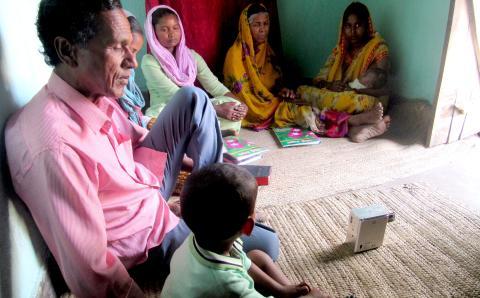People in stressful and challenging vocations often begin to look forward to the season of life we call retirement. The thought of having the luxury to rest at will begins to appeal. Or for those whose work life is all about the paycheck, with the actual work being boring and repetitive, the anticipated retirement can look like a holiday oasis consisting of pleasurable activities of one’s own choosing with no accountability to a company supervisor.
For others who love their work and are used to spending long days doing what they love, retirement may loom as an enemy ready to rob them of their productive lives and earning power. It may feel a bit like being deposited into a desert place that has very little to offer (other than spending time with family) that might give satisfaction and pleasure.
All of these responses to retirement are normal and even predictable. How we face this season of our lives will inevitably be colored by our life and work experiences and the beliefs we hold about the meaning of those experiences. Our physical, emotional, and mental health will also play a part. How we see ourselves as persons of worth (or not), as persons of little or much faith, with our own unique personality traits, likes, and dislikes, full of optimism or pessimism—everything about us will be part of the frame that contains our retirement years until our deaths.
Is retirement worth planning for? Are there creative ways to help us think through how the Holy Spirit might be calling us to follow Jesus in our retirement? Or is being intentional about how we want to live as retired persons wasted energy? Is it better to expect nothing, considering that declining health and lessening energy are inevitable? Should we just be grateful for each new day, since all we can do is decide in the moment how to fill our days as meaningfully as possible? Isn’t retirement simply the season where our only calling is learning to accept our inevitable decline graciously and without complaining? Isn’t it better to just take life as it comes, trusting in God’s care and love and accepting each new day as God’s gift?
As with so much in life, these two perspectives on entering retirement do not require an either/or response, but rather a both/and vision. In other words, God is not calling us to creatively plan for retirement or to trust in his grace for each new day even in the face of inevitable decline; rather, God is calling us to both.
It is important to remember that a call on our life at any stage is always personal, nuanced, and uniquely suited to God’s own purposes as well as to our own abilities and desires. So it doesn’t follow that changed circumstances or diminished capacity means God no longer calls us. What it does mean is that God is calling us to discover his will for our lives anew. As is true for God’s call at any stage of life, that task can be discerned only through prayer, time, and trial and error. The discernment process rests on the promise that God will work all things to our benefit, including our mistakes, to suit God’s purposes (Rom. 8:28).
When I started to think about retiring it wasn’t my work as a therapist that felt burdensome; rather, it was the mundane aspects of my work—the need for better computer skills and the need to allow for expanded administrative time—that propelled me toward making the decision to retire.
I began to dream of how freeing it would be to use my professional skills without the legitimate constraints and demands paid employment places on an employee’s time. I looked forward to a form of counseling that did not include the need for payment (Matt. 10:5-8). I also looked forward to combining dynamic healing prayer and counseling skills in a more intentional and focused way to help someone think, talk, and pray through difficulties to a resolution.
Through it all, I was aware that God was calling me into something new. Prayer with a close friend to help me discover what that new calling might look like made the discerning process feel like a shared partnership with the Holy Spirit. Now, when someone asks for my help, I offer coffee and conversation rather than “counseling.” For me, setting new parameters around what I could do to be helpful without overextending myself as I grew older included (1) not being paid, (2) not keeping files, and (3) setting limits to the number of appointments to engage with a person or a couple in focused conversations and prayer—no more than one morning per month for up to four months. I explain to “clients” that if they prefer a more formal, paid, and accountable therapeutic style, I would be happy to recommend someone else.
For this article I asked 25 seniors what they found most rewarding and most challenging about being retired. What they found most rewarding varied greatly: the freedom to pursue new hobbies, to develop new skills, to travel more, to spend more time with family or friends, and even to pursue new employment or volunteering in different settings.
Challenges mostly had to do with developing a new structure in retirement. Although people appreciated the freedom a retired lifestyle offers, H. remarked that “staying active” was challenging. S. observed that the “lack of a routine or structure” made retirement a “work in progress.” N. noted that “finding a new structure for my days” would get hijacked by “procrastination” very easily because of the lack of external accountability. Nevertheless, R., a retired university professor, remarked that the opportunity to pursue new “learning projects” made his retirement “a highly positive phase of life,” noting that the only challenges he experienced were health-related. Others echoed that sentiment.
The task of developing new habits to bring structure to our retired lives does not have to be burdensome. God’s children are called to be playful and carefree, expecting God to parent us into deeper understanding of his desires and will. We are never called to be orphans (John 14:15-21). From birth to death, life is a discovery tour. If we bring the curiosity of a toddler to the new experience of being retired, and if our expectation is that the Comforter will teach us the lessons we still need to learn before we die, then everything we engage in, including our sins and our sicknesses, teaches us lessons. “Come to me and learn from me,” says Jesus, and children always learn best by observing and imitating.
Sometimes when we feel stuck, overwhelmed, depressed, or helpless to experience our retirement in a positive light, we end up cutting ourselves off from others, isolating ourselves from friends and family. It might be tempting to retreat inwardly, to allow our world to become ever smaller and narrower. If that is your experience, resolve to take a chance on a treasure hunt in a library or bookstore. Books can inspire. The book that has inspired me the most with respect to getting older was Being Mortal by Atul Gawande. So find a book and begin to explore—and find a friend to share your experiences!
As you approach your own retirement, remember that this season is a gift that includes many treasures waiting to be discovered.
About the Author
Judy Cook is a family therapist and a member of Meadowlands Fellowship CRC in Ancaster, Ontario.






